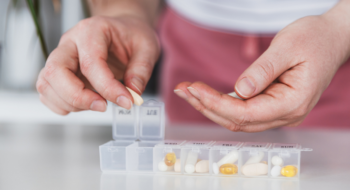If you’re like many people, there’s a good chance you aren’t getting enough vitamin D.
Vitamin D is important because it helps your body use calcium to support bone health, and it also plays a role in immune system and other key bodily functions.
However, approximately 40 percent of the U.S. population receives an insufficient amount of the nutrient, studies have shown.
As common as the deficiency is, it can be difficult to tell if your vitamin D levels are low without medical testing. Symptoms of a vitamin D deficiency can include fatigue, bone and joint pain and muscle aches or cramps. However, you may not experience any noticeable symptoms at all.
Screening
That’s why Thomas Plyler, a certified family nurse practitioner at Tidelands Health Family Medicine at The Market Common, screens every patient for vitamin D deficiency.
“I would say 70 percent of my patients are deficient in vitamin D,” he says. “They just don’t get enough naturally.”
Most people get vitamin D through sun exposure on their skin. Foods such as salmon, tuna fish and egg yolks, as well as orange juice and milks that have been fortified with the vitamin, can also help people achieve proper vitamin D levels.
People at higher risk of vitamin D deficiency include older adults and individuals with dark-colored skin. With age, our ability to make vitamin D can decrease, and it is more difficult for people with darker skin to make vitamin D from sunlight, increasing the risk for a deficiency.
In addition, people taking certain medications or who have certain medical conditions, including kidney or liver disease, obesity, celiac disease, cystic fibrosis and Crohn’s disease may be at increased risk.
Treatment
Fortunately, vitamin D deficiency is typically easy to treat by receiving more sunlight, ingesting more food that contains the nutrient or with supplements. Plyler usually prescribes smaller daily doses or a heavier dose once a week for several weeks to bring patients’ levels back to normal.
Enjoying this story? It’s free to republish. Learn more.
“And I always encourage people to get outside,” Plyler says. “It’s a simple fix for most people.”
It’s important to keep in mind that you can ingest too much vitamin D through supplements, so don’t take higher-than-recommended doses. Be sure to speak with your health care provider before beginning supplements or if you have questions or concerns regarding your vitamin D levels.

Thomas Plyler
Family Nurse Practitioner, Tidelands Health Family Medicine at The Market Common
Bio
Thomas Plyler is a certified family nurse practitioner who provides care at Tidelands Health Family Medicine at The Market Common in Myrtle Beach. He is accepting new patients.
Learn MoreMedical Education
Education
Walden University, Minneapolis, MN
Meet the Expert
Thomas Plyler
Thomas Plyler is a certified family nurse practitioner who provides care at Tidelands Health Family Medicine at The Market Common in Myrtle Beach. He is accepting new patients.






